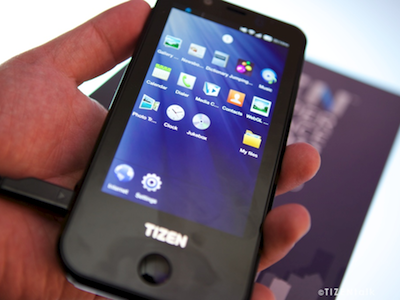Samsung's First Tizen Phone Possibly Delayed
Samsung's Tizen smartphone will probably be showcased during the company's first developer conference in October.
Samsung Electronics co-CEO JK Shin is reportedly behind the latest delay in the company's first Tizen smartphone. The device was originally expected to launch sometime in Q3 2013, but sources now claim that Shin wants extra time to "create the best smartphone", thus pushing the launch window into Q4 2013 instead.
The deciding factor over the delay seems to be revolved around the hardware set. Samsung was reportedly testing Tizen OS on a device similar to the Samsung Galaxy S3, but given that this will be the company's very first Android-killing device, the specs need to be phenomenal. Samsung engineers are reportedly saying the decision has nothing to do with the OS itself, and that the platform doesn't require high-end specs.
The delay is understandable: the Samsung Galaxy S3 was released last year. If the company is looking to launch a flagship Tizen phone, it will need specs similar to the upcoming Galaxy Note III which is slated to make its debut on September 4 in Berlin. Heck, it wouldn't be surprising if the company decided to introduce the Tizen solution during the same pre-IFA event.
Tizen OS is an open-source Linux-based platform for devices like smartphones, tablets, Smart TVs and in-vehicle information devices. The project resides within the Linux Foundation, is governed by Samsung and Intel, and contains Samsung's merged Bada project and Intel's failed MeeGo platform. It was believed that the Tizen project was actually dead until the two companies recently opened a $4 million USD competition for developers to create Tizen-based apps.
Tizen OS was originally released in January 2012, and is now at version 2.2. This latest build sees the H/W back key and menu key replacing S/W keys, and fine-grained Access Control for API privileges powered by Smack. The new build also provides new IDE and tools, including secure profile UX, UI customizer and live editing/preview for CSS/HTML5 files. CSS and HTML5 are the native format of Tizen apps.
On Monday Samsung opened registration for its first-ever Samsung Developer Conference that will take place in San Francisco on October 27 to October 29. As reported last month, the conference will cover multiple platforms and multiple products, and focus on Samsung's various tools and SDKs like the Chord API, and the digital living room. Tizen is expected to be a part of this conference, meaning that if the phone doesn't show up next week, then it will most likely be revealed during this developer conference.
If there's a company that could make the Tizen dream happen, it would be Samsung. The company is at the forefront of Android, beating out not only the Android-based competition, but Apple's own iPhone 5 sales. The company shipped 400 million phones in 2012, and will likely take its Android business sense and apply it to this new platform that could eventually sever its Android ties with Google, if successful.
Get Tom's Hardware's best news and in-depth reviews, straight to your inbox.
Follow us @tomshardware, on Facebook and on Google+.

Kevin Parrish has over a decade of experience as a writer, editor, and product tester. His work focused on computer hardware, networking equipment, smartphones, tablets, gaming consoles, and other internet-connected devices. His work has appeared in Tom's Hardware, Tom's Guide, Maximum PC, Digital Trends, Android Authority, How-To Geek, Lifewire, and others.
-
robochump All mobile device OSes rely on apps to be appealing. If Tizen has lack luster app support then it will just a phone for nerds that refuse to go mainstream iOS/Android just be cause they are popular...lol.Reply -
g00fysmiley most successful droid company trying to replace anroid operating system... i liek my samsung phones, and i wish them luck, but they have to realize alot of people are going to want to stick with what they know, myself included i have invested in productivity apps and games fo rmy galaxy nexus and would be hesitant to swap to a new device that would nto support the apps i already have linked ot my account. if it better be amazing... or maybe just aimed at a niche market like a super secure phone/buisness purposes phone or something like that.Reply -
Grandmastersexsay Reply11452065 said:All mobile device OSes rely on apps to be appealing. If Tizen has lack luster app support then it will just a phone for nerds that refuse to go mainstream iOS/Android just be cause they are popular...lol.
Unless it was a real Linux OS. Then it would run programs, not crappy apps that care more about tracking your personal information and selling it to advertisers than making a quality app.
